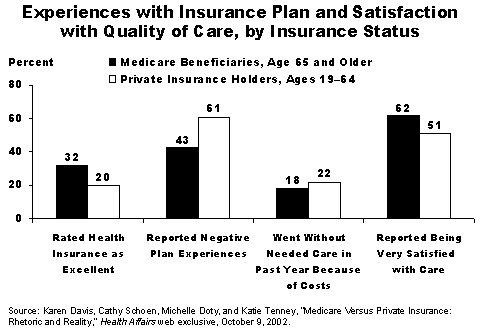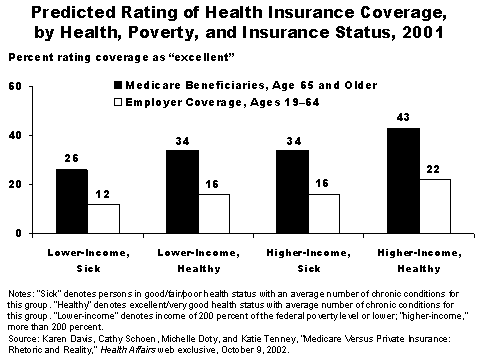Recent debates about the future of Medicare have included a range of proposals that would restructure the program to operate more like private insurance. Findings from The Commonwealth Fund 2001 Health Insurance Survey, however, show that Medicare outperforms private sector plans in terms of patients' satisfaction with quality of care, access to care, and overall insurance ratings.
In Medicare Versus Private Insurance: Rhetoric and Reality, Commonwealth Fund President Karen Davis and colleagues Cathy Schoen, Michelle Doty, and Katie Tenney present new evidence on how well Medicare works for beneficiaries compared with how well private insurance works for persons under age 65. Their analysis is based on data gathered by Princeton Survey Research Associates from April through July 2001. Interviews were conducted with a random national sample of 3,457 adults age 19 and older.
In their report, Davis and coauthors find that elderly Medicare beneficiaries are more likely than enrollees in employer-sponsored plans to rate their health insurance as excellent (32% vs. 20%) and less likely to report negative experiences with their insurance plans (43% vs. 61%). Medicare beneficiaries are also less likely than those with private insurance to go without needed care owing to costs (18% vs. 22%). The survey also finds that elderly Medicare beneficiaries are more likely to report being very satisfied with the care they received compared with those with private insurance (62% vs. 51%).
As the chart below illustrates, private insurance holders are actually less satisfied with health care and more concerned about costs than Medicare beneficiaries. The fact that Medicare was systematically more likely than employer coverage to be rated as excellent across income and health status categories challenges the received wisdom that Medicare is "out of date," and should "catch up" with the private insurance model. "Would-be Medicare reformers need to be cautious if they want to make the program more like the private sector," the authors conclude.

Medicare beneficiaries' more positive access experiences and ratings of care also indicate that their coverage is working relatively well in providing choice of services and access to needed care. This may be because most Medicare beneficiaries are covered under the traditional fee-for-service program, while adults with employer coverage are more likely to be enrolled in managed care plans. As a result, Medicare beneficiaries have a wider choice of physicians and fewer restrictions on care, such as the prior approval for specialist services required by many managed care plans.
The survey findings indicate that such attributes are linked to higher levels of satisfaction and reduced likelihood of access and medical bill problems. Thus, attempts to reform Medicare that would pattern coverage on private employer insurance run the risk of undermining the confidence of those it is designed to serve.
Medicare beneficiaries tend to be sicker and poorer than those covered by employer plans. However, regardless of income or health status, those on Medicare are more likely to rate their coverage as excellent.
In spite of evidence pointing to Medicare's strengths, the need for a Medicare prescription drug benefit remains clear. For those without such a benefit, insurance ratings are lower, access to care problems greater, and out-of-pocket costs for all medical care and for prescription drugs and dental care higher.

Facts and Figures
- Twenty-two percent of privately insured people found that their plan did not pay for care that they thought was covered, compared with 9 percent of elderly Medicare beneficiaries.
- Nine percent of privately insured people had difficulty getting a referral to a specialist, compared with 2 percent of elderly Medicare beneficiaries.
- Medicare beneficiaries were more likely to be very confident in their ability to get care in the future as those covered by employer plans (60% vs. 37%).
- Thirty-three percent of privately insured people were unable to pay their bills or had been contacted by a collection agency, compared with 18 percent of elderly Medicare beneficiaries.